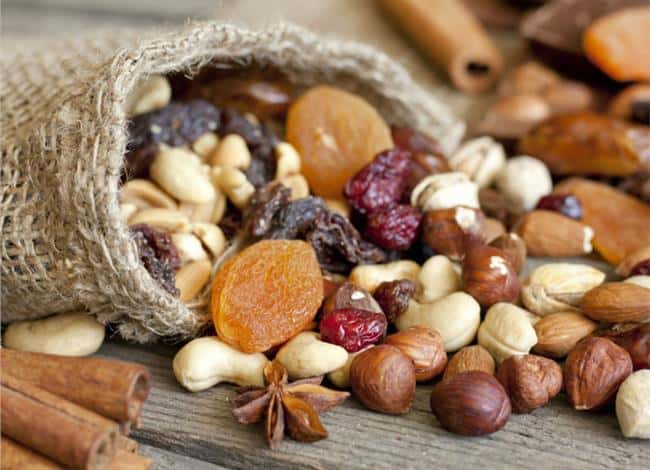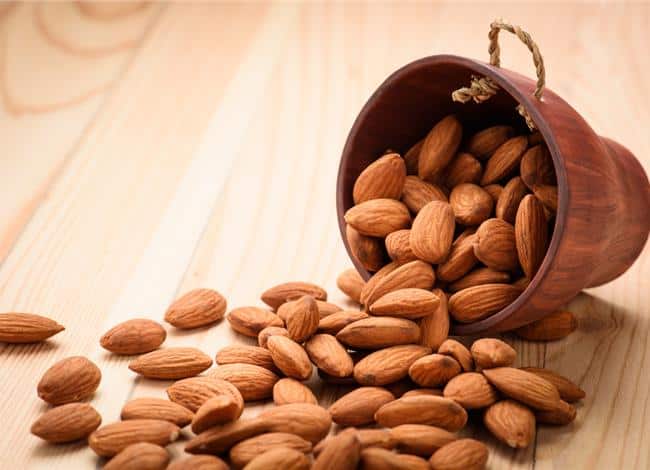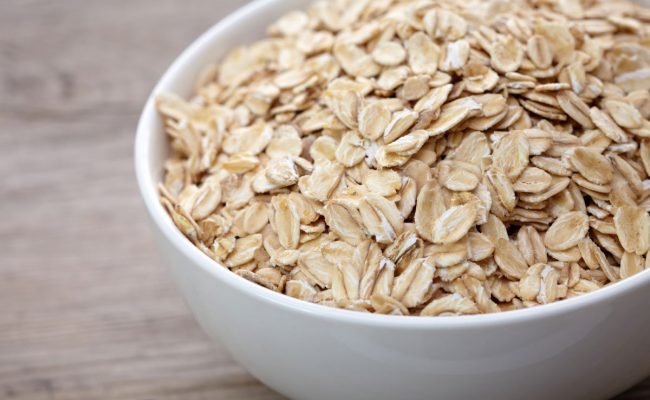
Eating a small handful of nuts most days of the week can offer you many health benefits and could even help you live longer according to some epidemiological studies. Eating nuts may help lower risk for certain diseases like some cancers and heart disease. How could nuts help improve health?
Researchers are still understanding the relationship between nut consumption and disease risk, but one reason they are so healthy is because they are rich in minerals, heart healthy fats, protein, fiber and antioxidants.
There is no need to fear eating nuts as part of a healthy diet for weight loss even though they are higher in calories and fat. Studies have shown consistently eating a moderate serving size of nuts does not increase risk for weight gain.
The fiber, protein and fat combination in fats gives them a high satiety value, and some experts suggest not all the energy from nuts is absorbed.
Eating nuts in place of high carbohydrate foods is beneficial for heart health.
Nuts are low in sugar compared to packaged snacks which can be beneficial for blood triglyceride and glucose levels.

How much and what type?
There is no need to go overboard with nut consumption. Following the recommended one to one and a half ounce serving per day has been shown to have health benefits from research studies.
Eating nuts at least three times a week has been shown to be beneficial, but daily nut consumption could be a goal.
The nutritional profile for each type of nut can vary, but the health benefits from nuts can be from any type of nut.
See also: Best healthy nuts and seeds for weight loss.
According to Harvard Health (1), there is no one perfect nut. In fact, eating a variety of types of nuts could provide the widest nutritional benefit. Brazil nuts, pistachios, walnuts, peanuts, almonds, cashews, etc. can all be incorporated for health benefits.
Nuts can be enjoyed by themselves as a snack or paired with some dried fruit to boost the fiber and antioxidant value.
They can be sprinkled on salads, oatmeal, yogurt or crushed as a coating for fish and chicken. Eat mainly plain nuts and stay away from flavored nuts as these can have extra sodium, sugar and artificial ingredients.
Nutrients in nuts
Besides containing protein and fiber, nuts are a good source for many micronutrients and antioxidants.
Each nut can offer a slightly different nutritional profile, but in general nuts provide the following nutrients (2):
- Antioxidants vitamin C and E
- Selenium (especially high in Brazil nuts)
- Potassium
- B vitamins
- Manganese
- Calcium
- Iron
- Omega 3 fatty acids
Lowered risk of mortality
A 2013 New England Journal of Medicine study (3) with over 75,000 women and 40,000 men concluded the frequency of nut intake was inversely associated with mortality. There was also specific reductions associated with cancer, heart disease and respiratory disease.
A 2015 study (4) also found long term nut intake was associated with a lowered mortality risk.
Following an eating pattern like the Mediterranean diet, which emphasizes olive oil, fruits, vegetables, legumes, whole grains and a higher fish intake has been associated with heart health overall health benefits.
Eating nuts as part of a Mediterranean like diet may give the most advantage for protection against diseases and mortality (5).
Brain health
Along with protecting against chronic diseases and even mortality, eating nuts on a daily basis could also be beneficial for brain and nerve health.
Nut intake can also protect against neurodegenerative diseases associated with aging like dementia (6).
Eating nuts in place of refined carbohydrates
Switching to eating nuts instead of refined carbohydrates like sweets, white bread, chips, etc. could be helpful for lowering triglycerides. A 2010 study (7) had people eat a low calorie diet for 12 weeks that included either 53 grams of pistachios as a daily snack or 56 grams of pretzels. Researchers found the group eating the pistachios had significantly lower triglyceride levels compared to the pretzel group.
Weight balance
There are many nutritional benefits to nuts, but some people are still hesitant to add them to their diet because they are relatively high in calories and fat.
Despite this, a 2008 study (8) points out nut consumption in epidemiological studies has been inversely associated with body mass index (BMI). This suggests eating a higher amount of nuts may actually protect against weight gain.
Studies that add nuts into the diet from 1-6 months did not show weight gain in study participants.
How can a high calorie food protect against weight gain?
Researchers suggest because nuts have a high satiety, they can help lower appetite and food intake after eating.
Another reason nuts may not lead to weight gain is even though nuts contain a lot of calories, you may not actually absorb all the energy from them.
Together, this may be why adding nuts to a healthy diet doesn’t translate to weight gain.
Conclusion
There are many reasons to incorporate nuts into your diet. Several large studies have shown an association between frequent nut intake and lowered risk for mortality especially with certain cancers, heart disease and pulmonary diseases.
Eating nuts could also help protect against age related diseases such as dementia.
Adding nuts to your diet won’t increase risk for weight gain even though they can be considered higher in calories.
Remember, you can’t eat an unhealthy diet, sprinkle in some nuts and expect weight loss and significant health gains.
Eating nuts as part of a healthy, balanced diet can be beneficial especially in place of refined carbohydrate foods.
Eating the recommended 1-1.5 ounces most days of the week is recommended. Nuts vary by type on their nutritional profile, but there is not one superior nut to others. For the best effect, add in a variety of nuts to your diet.










